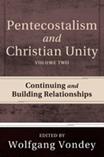Pentecostalism and Christian Unity 2, reviewed by Jim Purves
From Pneuma Review Fall 2013.
 Wolfgang Vondey, ed., Pentecostalism and Christian Unity, Volume 2 (Pickwick Publications, 2013), 301 pages, ISBN 9781620327180.
Wolfgang Vondey, ed., Pentecostalism and Christian Unity, Volume 2 (Pickwick Publications, 2013), 301 pages, ISBN 9781620327180.
It can be a terrible thing when we believe that we ourselves are right and all others are wrong. Terrible, because it can reinforce an arrogance caused by insecurity, causing us to be unwilling or resistant towards the legitimate Biblical perspectives and insights of others. Sadly, ignorance of the basis of faith shared with others, whose experience of church culture is sometimes so foreign and different from ourselves, can lead to caricature and even misrepresentation, often on the basis of anecdotal reflections or bad personal experiences.
This book is for those who are prepared to view things a different way. It is the second volume in a series looking at Pentecostal involvement in cross-denominational discussions regarding the basis of Christian unity. It is intended as a source book and reference work, divided into two parts. Firstly, a selection of narratives that represent ecumenical dialogues in which Pentecostals have recently been involved. Secondly, a selection of official reports on conversations between Pentecostals and two major denomination groupings, as well as the fruit of a conversation between Oneness and Trinitarian Pentecostals.
But this book is useful for more than that. It illustrated one important function of Pentecostalism, which is moving the agenda from abstract and obtuse theological concepts and categories into ‘what is real is what is experienced’. It invites an engagement in an ecumenism that focuses on missional matters, and the exploration of experiential realities: what it means to enter faith, to grow in faith, or to receive the Holy Spirit.
The narratives in part 1 are valuable in showing how people, coming from diverse backgrounds, can find a ‘cross check’ in confirming the propriety of their Christian practices. For whether we readily recognise it or not, there is—at the theoretical, dogmatic level—not always a lot to choose between in the differing systematic theologies offered by competing traditions because of shared roots in historic Christianity, they are sometimes simply amended copies or slight variations of one another. It is at the level of practices that we see the difference. The value of these conversations is in how they lead us to reflect on what we do; and on why we do what we do.
This collection of records and documents is also a book providing a good resource for those looking for a way of finding a positive interface between Pentecostals and both Lutheran and Reformed, as well as Roman Catholics.
Reviewed by James Purves


